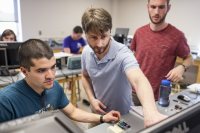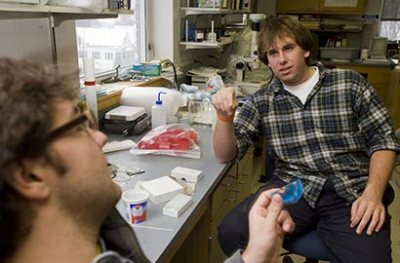
Commitment to sciences helps Bates land instrumentation award
Bates College has been awarded a $500,000 grant from the Sherman Fairchild Foundation to purchase seven scientific instruments that will enhance interdisciplinary collaborations among science faculty and research opportunities for students.
“We are delighted to receive this award from the Sherman Fairchild Foundation and anticipate that it will play a vital role in science research and teaching,” said Bates President Elaine Tuttle Hansen. “The criteria for the award are a perfect fit for Bates.”
Hansen noted in the grant application last year that because of Bates’ new general education requirements focusing on interdisciplinary learning, “the science faculty intentionally selected equipment to foster cross- and interdisciplinary collaborations, specifically in environmental geochemistry, the biomedical sciences and physics/physical chemistry.”
“One of the grant proposal reviewers mentioned that he and others were impressed with the College’s commitment to the sciences from the top administrators,” said Robert L. Pallone, director of corporate and foundation relations at Bates. “In a competitive field of college and university applicants, that certainly helped.”
Pamela J. Baker ’69, the Helen A. Papaioanou Professor of Biology and director of faculty research and scholarship, described how the science faculty met and together developed a list of equipment that would advance teaching and student research at Bates. “From the list, we asked for those pieces of equipment that would serve more than one department or program,” she said. “It is important that this equipment will be shared across departments and programs.”
The grant covers the cost of seven scientific instruments used by the biology, chemistry, geology and physics departments. But one — a specialized scanning electron microscope — accounts for $225,000 of the total cost.
A scanning electron microscope used for high resolution magnification of samples will tie in with Bates’ new Imaging Center. It will have the capacity for energy dispersive X-ray spectroscopy for elemental analysis or chemical characterization of a sample. Both will be used by students and faculty in the biology and geology departments and in the environmental studies program.
Other instruments to be purchased with the grant over the next five years include a multi-chamber respirometer system, an implantable telemetry system, an X-ray diffractometer, a particle size analyzer, an RF spectrum analyzer and quantitative polymerase chain reaction instrumentation.
The instruments are expected to be used by multiple disciplines in 40 courses that enroll about 800 students — benefitting science and non-science majors alike.
![]()



